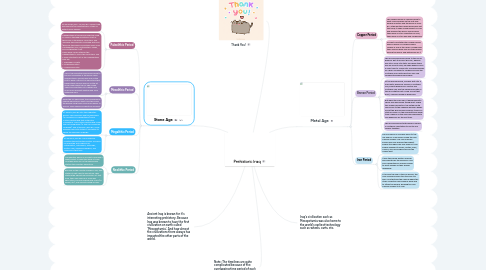
1. Stone Age
1.1. Paleolithic Period
1.1.1. At around 65,000 - 35,000 BC. Ancient Iraq was home to the Neanderthals. A type of extinct homo sapiens.
1.1.2. Neanderthals in this period might be living in caves in the high mountains. Most of them lives in the Zagros Mountains. And Iraq back then was still conjoined with Iraq (Because the Zagros mountains spans from Northwestern Iran, Southeastern Turkey, and Northeastern Iraq). There were 3 main sites for the Neanderthals to live in the mountains. The 3 main sites that a lot of the Neanderthals lives are: 1. Shanindar Locality 2. Ruwandose Sites 3. Sulaimaniya Sites
1.2. Mesolithic Period
1.2.1. Iran in the mesolithic period was home to the first civilization in the world called Mesopotamia. Iraq also was one of the first to have a little bit of agriculture that helped them survive and live a little bit more easier when the ice age ended. They also invented a lot of easier and much more efficient hunting and food gathering skills.
1.2.2. When the ice age ended, they recovered by making agriculture a thing. And this made the people living there much more easier to survive. Thus making a population increase.
1.3. Megalithic Period
1.3.1. At about 3,000 BC into the Megalithic period. The Sumerians and the Akkadians (A civilisation in Mesopotamia) had a cultural relationship that united the civilizations. This cultural relationship made the first bilingualism (A term for conjoined language). And at around 2,900 BC, some kingdoms and city states in Iraq began to speak the Akkadian language.
1.3.2. At around 4,000 BC. The Sumerians invented the first writing system. And also recorded the first evidence of Mathematics, Astronomy, Astrology, Written Law, Organised Religion, and Medicine in that time.
1.4. Neolithic Period
1.4.1. The neolithic period in Ancient Iraq made a great impact to what the world is today. And they were one of the people who started the Neolithic Revolution.
1.4.2. Because of the climate change in Iraq, they started to get used to agriculture. Thus starting the agriculture revolution. At that time, their main source of food was agriculture. Such as making field crops (i.e wheat, etc), and domesticating animals.
2. Ancient Iraq is known for it's interesting prehistory. Because Iraq was known to have the first civilization on earth called 'Mesopotamia'. And how almost the civilizations there always has impacted the other parts of the world.
3. Note: The timelines are quite complicated because of the overlapping time period of each period
4. Thank You!
5. Metal Age
5.1. Copper Period
5.1.1. The copper period in Iraq was home to what could possibly be the first ever empire in history and the world in 2600 BC. Although the copper period was not that long, it made a huge impact on Iraq and possibly the world. And because there were a lot of civilizations in Iraq, there were a lot of wars and conquering.
5.1.2. Ancient Iraq started the Copper Period when a person in Iraq discovered copper in one of the mines. Copper was then used for daily lives of other people around the world. And dated back for t
5.2. Bronze Period
5.2.1. The bronze period was home to the rise of Babylon. But at around 1800 BC, Babylon was still a small city state. And when there was an Amorite ruler, he made Babylon from a small town to a large city. Declaring himself as a king. He began to conquer and rule the Southern and Central parts of Iraq. And founded the Babylonian Empire.
5.2.2. At the bronze period, Iraq was split into 3 main parts which are: Assyria in Northern Iraq, Kassite Babylonia in Central and Southern Iraq, and the Sealand Dynasty in the far southern part of Iraq. And at that point, Iraq was named as Babylonia.
5.2.3. But when the ruler died, it descended into chaos and was quickly falling apart. While the Sealand Dynasty in the farther south came back to the Akkadian Empire's hands. And at the Bronze Age Collapse, it was in a state of chaos. So the Mesopotamian kings took a chance of the chaos and decided to rule Babylonia for the first time.
5.2.4. The bronze period started when a person in Northern Iraq started to mix tin and copper together.
5.3. Iron Period
5.3.1. The iron period in Iraq was home to the rise and fall of an empire called the Neo Assyrian Empire. The Neo Assyrian Empire was very big was the biggest empire the region has ever seen yet. The empire spanned to Persia, Parthia, Elam, Cyprus, and more regions across the Middle East.
5.3.2. It was this period Eastern Aramaic was adopted by the Assyrians. And also Mesopotamian Aramaic began to plant Akkadia as their spoken languange.
5.3.3. At around the end of the iron period, the Neo Assyrian Empire tore itself by civil wars. And that was the chance where the other civilizations and regions were able to attack the empire. Bringing teh Neo Assyrian Empire to it's fall.
